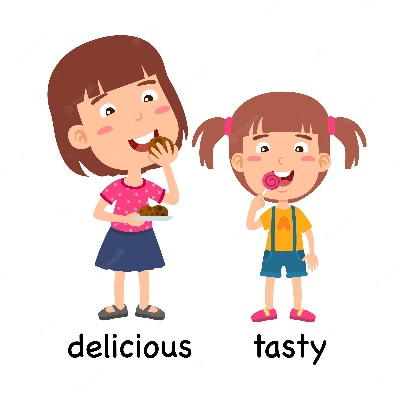Synonyms are words that have the same or nearly the same meaning as another word in the same language. They help us to avoid repetition in our writing and make our language more interesting and expressive. For example, the words “happy” and “joyful” are synonyms because they both convey a similar feeling of happiness.
Why Are Synonyms Important?
- Enhance Vocabulary: Learning synonyms helps students expand their vocabulary.
- Improve Writing: Using synonyms makes writing more varied and engaging.
- Better Communication: Synonyms allow for more precise expression of ideas.
Here is a list of common synonyms that you should learn:
- Happy – Joyful, Cheerful, Glad, Delighted
- Sad – Unhappy, Sorrowful, Miserable, Gloomy
- Big – Large, Huge, Gigantic, Enormous
- Small – Tiny, Little, Miniature, Petite
- Smart – Intelligent, Clever, Bright, Brilliant
- Dumb – Stupid, Foolish, Silly, Unintelligent
- Fast – Quick, Rapid, Swift, Speedy
- Slow – Sluggish, Leisurely, Unhurried, Gradual
- Angry – Mad, Furious, Irritated, Enraged
- Calm – Peaceful, Serene, Tranquil, Relaxed
- Hot – Warm, Boiling, Scorching, Sizzling
- Cold – Chilly, Freezing, Frosty, Icy
- Tired – Exhausted, Weary, Drained, Fatigued
- Energetic – Lively, Active, Vibrant, Dynamic
- Brave – Courageous, Bold, Fearless, Valiant
- Scared – Afraid, Frightened, Terrified, Panicked
- Funny – Humorous, Amusing, Comical, Hilarious
- Serious – Grave, Solemn, Earnest, Thoughtful
- Begin – Start, Commence, Initiate, Launch
- End – Finish, Conclude, Terminate, Complete
- Help – Assist, Aid, Support, Facilitate
- Hurt – Injure, Harm, Damage, Wound
- Love – Adore, Cherish, Treasure, Worship
- Hate – Despise, Loathe, Detest, Abhor
- Old – Ancient, Aged, Elderly, Vintage
- New – Fresh, Modern, Recent, Novel
- Rich – Wealthy, Affluent, Prosperous, Opulent
- Poor – Needy, Impoverished, Destitute, Penniless
- Strong – Powerful, Mighty, Robust, Sturdy
- Weak – Frail, Feeble, Fragile, Delicate
- Clean – Tidy, Spotless, Neat, Immaculate
- Dirty – Filthy, Unclean, Messy, Grimy
- Easy – Simple, Effortless, Uncomplicated, Straightforward
- Hard – Difficult, Challenging, Tough, Arduous
- Quiet – Silent, Hushed, Peaceful, Muted
- Noisy – Loud, Boisterous, Raucous, Deafening
- Friend – Companion, Pal, Buddy, Ally
- Enemy – Foe, Adversary, Opponent, Rival
- Beautiful – Pretty, Attractive, Gorgeous, Stunning
- Ugly – Unattractive, Hideous, Repulsive, Unpleasant
By learning and practicing synonyms, students can enhance their vocabulary, improve their writing, and communicate more effectively. The exercises provided will help reinforce their understanding and ensure they can confidently use synonyms in their daily language.

















